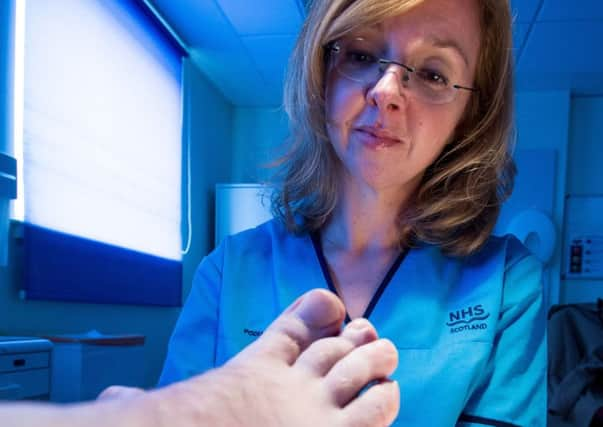The prescription revolution’s here


The medics will be given prescription pads after completing a university course.
Under a previous system, physiotherapists and podiatrists who qualified as “supplementary prescribers” had to secure a complicated three-way agreement with the patient and their GP.
Advertisement
Hide AdAdvertisement
Hide AdBut now 29 medics from the Lothians who have completed the Allied Health Profession training course at Edinburgh Napier University will be able to make decisions themselves.
They are the first to qualify since new laws aimed at saving GPs’ time were introduced.
Emma Brewin, an acute diabetes specialist podiatrist at Edinburgh Royal Infirmary, is among those who have completed the course.
She said: “Diabetic foot infections can be limb and life-threatening so they require rapid and aggressive management.
Advertisement
Hide AdAdvertisement
Hide Ad“My independent prescribing status allows me to prescribe antibiotics without the limitations of a clinical management plan, so patients have timely access to the drugs they require.”
Ann Thomson, leader of the course at Edinburgh Napier, said that the changes meant prescriptions could be provided at the “right time and the right place”.
She added: “Not only is this more convenient for patients, it also frees up the valuable time of GPs and other doctors.”
Practitioners on the course study in their own time before putting together a portfolio consisting of a 1500-word essay and evidence of a detailed clinical examination signed off by a doctor. The module, which is running again this academic year, also gives students a grounding in the laws within their area.
Advertisement
Hide AdAdvertisement
Hide AdSpecialist physiotherapists will then be able to prescribe medicines for patients with a wide range of conditions, including musculoskeletal, pain management and respiratory.
Podiatrists, who treat disorders of the foot, ankle and lower leg, will be able to prescribe drugs to diabetic patients with foot ulcers or people with wounds, ingrown toenails and fungal infections.
A group of students in England were the first to gain the new qualification because the laws was changed nine months earlier south of the Border.
In total, 44 students qualified from the first courses in Scotland, including 15 at Glasgow Caledonian University.
Ms Thomson expects patients and GPs to welcome the move.
Advertisement
Hide AdAdvertisement
Hide AdShe said: “A patient may see a physiotherapist about, for example, a sore back.
“The difference is that they’ll now be able to prescribe, if it’s appropriate, as part of the overall treatment programme.
“Someone suffering from rheumatoid arthritis could be prescribed medication at a physiotherapy appointment, or a podiatrist dealing with an infected ingrowing toenail will now be able to prescribe antibiotics.
“It’s all about making the care process that much better and smoother for the patient rather than them having to trail back to their GP,” Ms Thomson added.